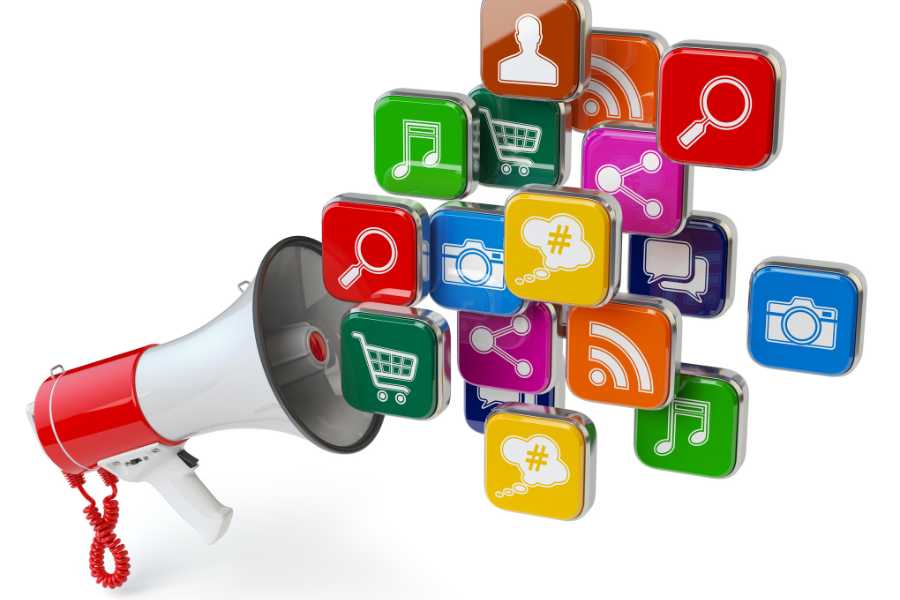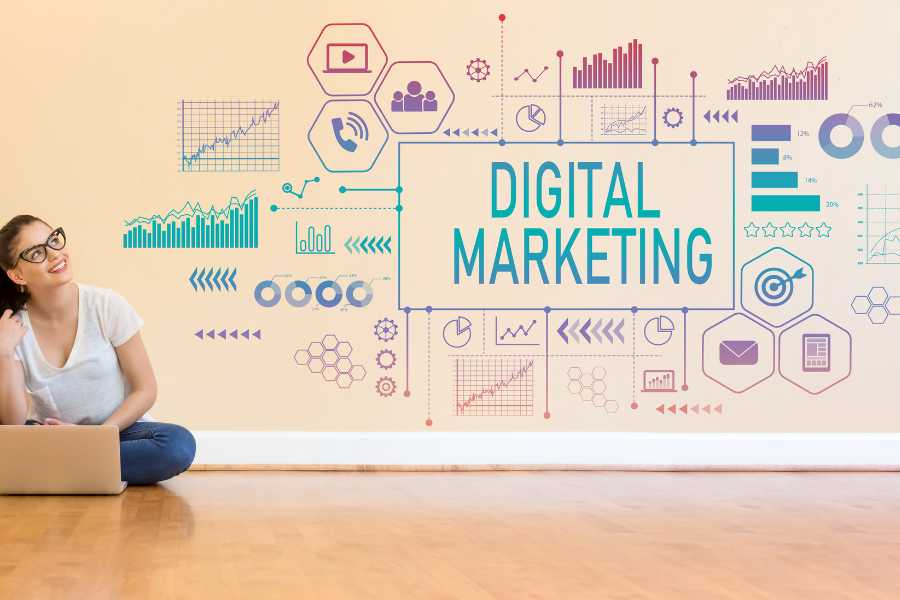If you’ve ever wondered, “What is digital marketing?”
Well, you’re in the right place.
As the internet becomes more ingrained in our daily lives, the importance of digital marketing has skyrocketed.
It’s not just about flashy ads or catchy slogans; it’s about establishing meaningful connections with potential customers in the digital realm.
Using precise targeting and personalized content, businesses can reach audiences like never before.
Intrigued?
Let’s begin.

What is Digital Marketing?
Digital marketing is like a megaphone for the digital age, an orchestra conductor leading a harmonious ensemble of various online marketing disciplines.
It amplifies a brand’s voice, reaching thousands, if not millions, of potential customers on their laptops, phones, and tablets.
But it’s not just about making noise.
Successful digital marketing means saying the right thing, at the right time, to the right people. It’s about being engaging and insightful, delivering value and fostering relationships.
And what about inbound marketing, you might wonder?
While it’s true that both inbound and digital marketing strive to attract a potential customer, inbound marketing is but one piece of the larger digital marketing puzzle.
Inbound marketing focuses on creating valuable content and experiences tailored to the audience, pulling them in naturally.
Whereas digital marketing encompasses inbound tactics and a plethora of other strategies like paid online ads, SEO, email marketing, and more.
Why is Digital Marketing Important?

In an era where our lives are increasingly digital, the significance of digital marketing can’t be overstated.
As the traditional marketplaces and billboard ads give way to virtual stores and targeted online campaigns, the impact and benefits of digital marketing become even more apparent…
Reach
In the vast landscape of the internet, potential customers are just a click away.
Where else can you find millions of potential customers in one place?
Probably nowhere else but the digital world.
Think of a video on YouTube that goes viral, reaching millions globally in a matter of hours — that’s the power of digital reach.
Targeting
Digital marketing takes targeting to a new level of precision.
Imagine showing your ads only to people who are interested in your products based on their online behavior, interests, and demographics.
For example, an eco-friendly clothing brand can target customers who show interest in sustainable fashion, ensuring its marketing budget is spent on those most likely to make a purchase.
Cost-Effective
Budget constraints are a significant consideration for many businesses, particularly small ones.
Digital marketing is more cost-effective compared to traditional marketing, allowing small businesses to stand tall among the giants.
For instance, running a social media campaign on platforms like Facebook can be far cheaper than launching a traditional marketing strategy on television or radio.
Measurable
Digital marketing offers tangible and real-time data.
With digital marketing, you can track the success of your marketing campaign in real-time, making necessary adjustments on the go.
You can monitor which blog posts are popular, what type of email prompts a customer to make a purchase, or which social media campaign drives the most engagement, allowing you to focus resources on what works.
Engagement
Digital marketing isn’t just about selling a product or service; it’s about building a community around your brand.
Social media platforms offer a unique opportunity to engage directly with customers, fostering a community that traditional marketing cannot.
For example, a company can launch a hashtag campaign to encourage customer participation and generate buzz around a product.
By deeply understanding the significance and mechanisms of digital marketing, you can harness its full potential to enhance your business’s online presence and foster meaningful customer relationships.
There’s a whole world of opportunities in the digital realm waiting for you to seize.
8 Vital Digital Marketing Types That’ll Amplify Your Growth

Digital marketing is a vast field with many sub-disciplines.
Here are 8 types you should know about…
1. Content Marketing
Content marketing goes beyond the confines of mere sales pitches and promotions. It’s about creating a narrative around your brand, a story that resonates with your audience on an emotional level.
At its core, content marketing seeks to inform, entertain, and inspire. Imagine creating an informative blog post that helps your readers solve a problem they’ve been facing.
They not only appreciate the value you’ve provided but also begin to perceive your brand as an expert, a resource they can trust.
For example, let’s say you’re a small gardening business.
You could create blog posts about how to care for plants, tips on organic gardening, or even step-by-step guides on creating a backyard oasis.
You’re not directly selling anything in these posts, but you’re building trust and providing value, which, over time, will likely result in increased sales and customer loyalty.
2. Search Engine Optimization (SEO)
SEO is much like a digital popularity contest. But, the vote isn’t decided by mere whims; it’s all about relevance and quality. It’s not enough to pepper your content with keywords.
Your content needs to deliver value, and your website needs to provide an excellent user experience. This involves ensuring your site is mobile-friendly, secure (HTTPS), and loads quickly.
Google, being the user-centric search engine it is, rewards websites that prioritize the user experience.
For instance, a local bakery might use SEO strategies to rank for keywords like “gluten-free bakery in [city name]” or “organic bread in [city name]”.
With good SEO, their website would appear in the top search results when potential customers search for these terms.
These high search rankings increase visibility and drive more organic traffic to the site, which could lead to increased sales and growth.
3. Social Media Marketing

At its best, social media marketing creates a dialogue, a two-way interaction that fosters a sense of community around your brand.
It’s not just about pushing content; it’s about listening and engaging with your audience, addressing their comments and concerns, celebrating their achievements, and learning from their insights.
Take the example of a clothing brand.
On a social media platform like Instagram, they could share stylish photos of their latest collection, but they could also feature real customers wearing their products, host live Q&A sessions with the designers, or run contests that encourage user-generated content.
This approach transforms customers into brand ambassadors, amplifying the brand’s reach and authenticity.
4. Email Marketing
While it might seem outdated compared to newer, flashier forms of digital marketing, email marketing remains a crucial player in the game.
Its strength lies in its personal nature and directness.
With email marketing, you’re not broadcasting a message to the masses. Instead, you’re delivering a custom message right into an individual’s inbox.
Imagine a bookstore that sends personalized reading recommendations based on a customer’s previous purchases.
Or a software company that sends helpful tips and tutorials to new users to help them get the most out of their product.
By providing targeted and valuable content, these brands are nurturing their relationships with their customers, leading to increased retention and loyalty.
5. Search Engine Marketing (SEM)
When it comes to making your digital presence felt, Search Engine Marketing, or SEM, takes a front-row seat. SEM encompasses various paid strategies designed to enhance your website’s visibility on search engines like Google.
One of the most common forms of SEM is Pay-per-click (PPC) advertising.
As the name suggests, businesses only pay when a user clicks on their ad. It’s an efficient strategy because you only pay for actual results.
Another powerful strategy under SEM is Google Ads.
With this digital marketing tool, you can have your website appear on the top of the search results for chosen keywords.
Remember, SEM isn’t just about driving traffic; it’s about driving the right traffic. With effective keyword research and careful targeting, SEM can bring in users who are ready to engage with your product or service.
6. Influencer Marketing

The power of personal recommendation cannot be understated, and that’s where influencer marketing comes in.
In this digital age, influencers — popular figures on social media — act as a bridge between brands and potential customers.
Suppose you’re a business selling hiking gear.
Partnering with an outdoor enthusiast who has a large following on Instagram could help introduce your products to an audience that’s likely to be interested.
But remember, influencer marketing is more than just celebrity endorsement. It’s about authenticity and trust.
Choosing influencers who genuinely resonate with your brand and its values is paramount to the success of your digital marketing campaign.
7. Affiliate Marketing
Affiliate marketing is a mutual beneficial approach where businesses reward third-parties (affiliates) for each visitor or customer brought about by the affiliate’s marketing efforts.
Essentially, it’s digital word-of-mouth marketing that can significantly boost your reach and sales.
For example, let’s say you sell skincare products. An affiliate, maybe a beauty blogger, reviews your product and shares an affiliate link.
Every time a reader purchases your product through that link, the blogger earns a commission.
Not only does this method drive sales, but it also improves brand awareness without a large upfront investment.
The key is to partner with affiliates who have a strong connection with your target audience.
8. Video Marketing

With the soaring popularity of platforms like YouTube and TikTok, it’s evident that video content is a kingpin of the digital marketing world. Video marketing is the practice of creating and sharing engaging videos to promote a brand, its products, or services.
Think of video marketing as storytelling in motion.
Whether it’s a behind-the-scenes look at your operations, a step-by-step product tutorial, or customer testimonials, videos can provide immersive experiences that static content often can’t.
For instance, a clothing brand might showcase its summer collection through a beautifully shot video featuring models wearing the clothes in various sun-soaked locales.
Moreover, videos are great for explaining complex concepts in an easy-to-understand way.
For instance, a tech company could use animated videos to explain how their software works.
In a nutshell, video marketing can be a creative, engaging, and highly shareable way to connect with your audience. Not only does it improve conversion rates, but it also boosts social shares, driving more traffic to your website.
Take Action by Answering What is Digital Marketing to You?
So, you’ve come a long way, haven’t you?
Maybe you felt overwhelmed at first — like stepping into a whole new world.
But here you are now, understanding the ropes of digital marketing.
It’s a brave new digital world out there, and you’re more ready than you think to conquer it.
Stand tall, knowing you’re equipped to navigate the digital marketing landscape with ease.
And remember, the digital realm waits for no one, so go forth and make your mark!



